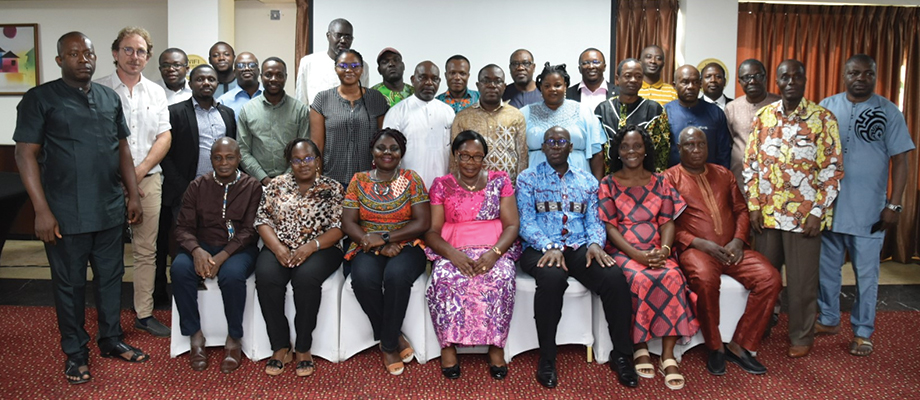Assessing priority fisheries in the Gulf of Guinea using the EAF implementation monitoring tool

29 May to June 2 2023, Accra, Ghana – For five days, representatives of organizations, administrations, scientists, researchers and fisheries stakeholders from the member countries of the Fisheries Committee for the West Central Gulf of Guinea (FCWC), Benin, Cote d'Ivoire, Ghana, Liberia, Nigeria and Togo, reviewed and assessed the status of the ecosystem approach to fisheries (EAF) management in priority fisheries in the region using the EAF implementation monitoring tool (IMT).
The EAF IMT was developed by the EAF-Nansen Programme as a tool for monitoring the EAF, and is therefore structured around the three main components of the EAF: the ecological well-being, human well-being and capacity for success. It can be used by countries in the strategic and operational planning processes for each of their fisheries to determine where they are making acceptable progress and where there are still gaps and challenges to be addressed.
The EAF IMT can also be used for decision-making and planning during the fisheries management process. It is not a "judgement" tool, although it is designed to generate scores. The most valuable result of its use is the discussion that the scoring process usually generates and the discipline required to clearly justify each of the scores.
The regional working group was organized by the EAF-Nansen Programme and FCWC to promote the EAF and support fisheries institutions to manage their fisheries sustainably.
Over the course of the five days, the participants received presentations and practical training in the use of the EAF IMT using data from the FCWC member states. The aim of this exercise was to help administrations and fisheries stakeholders assess the effectiveness of their actions from the perspective of ecological well-being, human well-being and the capacity for success of the measures.
Alain Kodjo, Fisheries Program Administrator at the Ministry in charge of Fisheries in Côte d'Ivoire and FAO-EAF-Nansen Program focal point in Côte d'Ivoire, said: "This tool makes it possible to establish a reference situation. It will allow us to evaluate mid-term the results obtained in the field because it takes into account all the components of the ecosystem approach. It is therefore an important tool for governance because one cannot manage without self-assessment. To be part of the cycle of fisheries management, when we adopt a management plan with the participation of all and clear objectives, we must regularly evaluate to assess progress. It is therefore a very good approach to make the management of our fisheries sustainable,”
Williams Akonbi, Chief Research Officer of the Nigeria Institute for Oceanographic and Marine Research, said: “The EAF-IMT is very important and useful for fisheries management if the procedure is followed. We have used it successfully for the development of the Industrial Fisheries Management Plan in Nigeria. The key is that when developing a management plan, all stakeholders are involved and participate in the whole process. Ultimately, the best available information will be gathered by each participant or stakeholder and the resulting management plan will be the product of everyone's work. The use of this tool is very important, because for many of us it is a capacity building tool, which will allow us, once back in our respective countries, to apply it to our activities. Because it gives insight into how the process is conducted from start to finish, and how the implementation process can be completed. Learning this tool and implementing it will help us manage the fishery better."
Florent Degboe, the Secretary General of the Federation of Marine and Artisanal Fishermen of Benin, said: “The EAF-Nansen Programme has enabled us to become aware of many ecological and environmental realities. At home, thanks to the “Beach Seine” project, we have understood the need for biological rest to facilitate the renewal of the marine flora and the registration of our boats to organize our activity. Currently, we are still at the beginning of the application of the various measures. There are certainly some small resistances but thanks to the awareness sessions, things have started to go back to normal. And concerning the use of the tool for monitoring the implementation of the EAF for which we are trained, I think that it will be able to contribute to better helping us to evaluate and soon know the repercussions for the actors of the fishery and our families, of the various measures that we are implementing. Thanks to the results that will be obtained, we will be able to better sensitize our peers to fully adhere to the reforms. »
About the EAF-Nansen Programme
The EAF-Nansen Programme supports partner countries and regional organizations in Africa and the Bay of Bengal to improve their capacity for the sustainable management of their fisheries and other uses of the sea as well as their coastal resources, through the implementation of the ecosystem approach to fisheries (EAF), and the consideration of impacts of climate and pollution.
The Programme is executed by the Food and Agriculture Organization of the United Nations (FAO) in close collaboration with the Institute of Marine Research (IMR) in Bergen, Norway, started in 1975. It is funded by the Norwegian Agency for Development Cooperation (Norad).
About the Fisheries Committee for the West-Central Gulf of Guinea
The FCWC facilitates cooperation in fisheries management between member countries, namely: Benin, Côte d'Ivoire, Ghana, Liberia, Nigeria and Togo. Having in common important fish stocks, these countries have identified a need for cooperation and shared management of these resources.
The primary objective of the FCWC is to guarantee the sustainable development of fisheries resources in its area of intervention. Specifically, these include rebuilding and maintaining robust fisheries resources through policy reforms, cooperative regulatory planning, good governance and institutional improvements; to develop and implement appropriate management frameworks that guarantee the sustainable exploitation of fishery resources, the improvement of intra-regional and international trade in fish and fishery products and the obtaining of maximum economic and social benefits from the fishery.
More on the topic:
